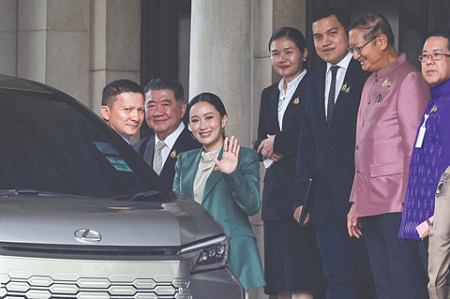
Thailand’s Constitutional Court suspended Prime Minister Paetongtarn Shinawatra from her duties on July 1st, plunging the nation into a fresh political crisis. The suspension will remain in effect while the court deliberates on a petition filed by 36 members of parliament demanding her permanent removal from office. The charges stem from a leaked telephone conversation with former Cambodian leader Hun Sen, which took place amid heightened border tensions between the two nations over disputed ancient temples.
The controversy erupted after a recording surfaced in which Shinawatra was heard advising Hun Sen, now a Cambodian senator, to disregard a prominent Thai general. In the call, she allegedly described the general as someone who “wants to look cool” and referred to her own country’s military as “the other side.” These remarks, made to a foreign official during a delicate diplomatic standoff, were deemed a severe breach of ethical standards by her political opponents, who also filed complaints with anti-corruption and election commissions. Deputy Prime Minister Surya Juangroongruangkit has been appointed as the acting head of government.
The political fallout was swift and severe. The leaked call triggered mass protests in Bangkok, with thousands demanding the prime minister’s resignation. Even Hun Sen, a long-time friend of the Shinawatra family, publicly called for a change in Thai leadership, expressing doubts about the prime minister’s ability to resolve the border dispute. The crisis further weakened Shinawatra’s government when the Phumchaithai party withdrew from the ruling coalition, leaving her with a precarious parliamentary majority. In a last-minute maneuver before the court’s decision, Shinawatra reshuffled her cabinet and appointed herself Minister of Culture, a move that allows her to remain in the cabinet despite her suspension as premier.
This episode is the latest chapter in Thailand’s long history of political instability, often characterized by the removal of leaders through judicial rulings or military coups. Shinawatra’s fate mirrors that of her predecessor, Srettha Thavisin, who was ousted in 2024 over an ethics violation. The event also evokes the downfalls of her own family members: her father, Thaksin Shinawatra, was removed in a 2006 coup, and her aunt, Yingluck Shinawatra, was ousted by another in 2014.
Analysts suggest the current crisis is symptomatic of a deeper power struggle between the political forces loyal to the Shinawatra family, represented by the Pheu Thai party, and the country’s conservative establishment, which includes the military and judiciary. Experts note that historically, when such confrontations have escalated and been fueled by mass protests, they have invariably led to a change in government. The military, while currently silent, has a track record of intervening in politics when it deems it necessary, leaving the future of Thailand’s leadership uncertain and raising questions about when new elections will be held and if a period of prolonged instability can be avoided.
